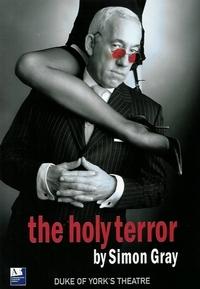The Holy Terror
The publishing world is often caricatured as a nest of corporate vultures; hungrily looking for some ghastly literary corpse that they greedily anticipate the public will purchase in mass and hopefully force to the top of the best-sellers list, thereby providing mega-bucks for the money hungry shareholders of publishing houses to gorge themselves. The culture-numbing mantra that runs through the mind of these deprived creatures is 'Will it sell and for how long?' Long gone are the days of genteel family owned publishers who cared about literature; take-overs, mergers and ghastly conglomerates have destroyed them all!
In 'Holy Terror' Simon Gray tells the tale of Mark, a ruthless publisher who takes on the job of saving a highly respected book publisher that has fallen on hard times. However, it is not long before Mark himself falls on hard times as he suffers a mental break-down, the first indication being a paranoid belief in his wife's unfaithfulness.
The play is told in the form of a confessional talk, in which the troubled and still recovering Mark is addressing a meeting of the Women's Institute in Chichester or is it Cheltenham (He seems unable to remember!). We watch a series of flashbacks as he bonks his secretary, manipulate his authors, patronises the former proprietor and terrorises his servile editor. He plans a publication called "Masturbation without shame", whose only function seems to be to humiliate his editor and cause friction within the office, all of which Mark finds highly entertaining.
There are too many easy comic targets in Simon Gray's script; the Scottish author who composes in incognisable Glaswegian verse, the middle aged woman who gets vicarious pleasure writing about her heroines sexual bondage fantasies, and the intense gay intellectual who has belatedly come out of the closet, there is even talk of a farce written in heroic couplets.
Simon Callow gives a ubiquitous performance as Mark, his sardonic leer growing ever more grotesque as the play continues. His portrayal shifts from an ingratiating broken man, endlessly apologising to the Woman's Institute for his outlandish and apparently uncontrollable behaviour, to an unrestrained glee in childish tantrums and fits of adolescent sexual groping. Whilst I initially found his portrayal gently amusing, Callow's ever growing histrionics soon turns the character of Mark into an interminable bore.
It is left to the remainder of the cast to provide some much needed light relief to Callow's histrionics, especially Tom Beard who plays four different male characters, providing each with a light comic touch.
Alan Bird
What other critics had to say.....
NICHOLAS DE JONGH for THE EVENING STANDARD says, "Unbelievably dull and juvenile comedy of social manners." RHODA KOENIG for THE INDEPENDENT says, "Watching Holy Terror is like being trapped by a control freak who has nothing to say." CHARLES SPENCER for THE DAILY TELEGRAPH says, "Both original and wildly entertaining, but finally fails to convince in its account of the bewildering horror of mental illness." BENEDICT NIGHTINGALE for THE TIMES says, "Some funny moments." ALASTAIR MACAULAY for THE FINANCIAL TIMES says, "Laurence Boswell directs smoothly. But is there anything about the people or opinions in Gray's play that he or his actors actually like or believe?" MICHAEL BILLINGTON for THE GUARDIAN says, "At his best, Gray offers a scorching critique of the English male's emotional detachment; here he fails to get inside the head of his disintegrating hero."
External links to full reviews from popular press
The Independent
The Guardian
Daily Telegraph
Financial Times
The Times
Originally published on
